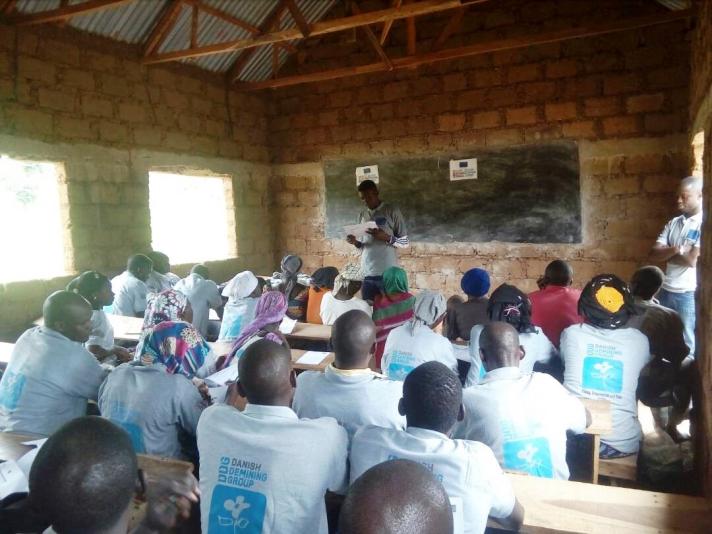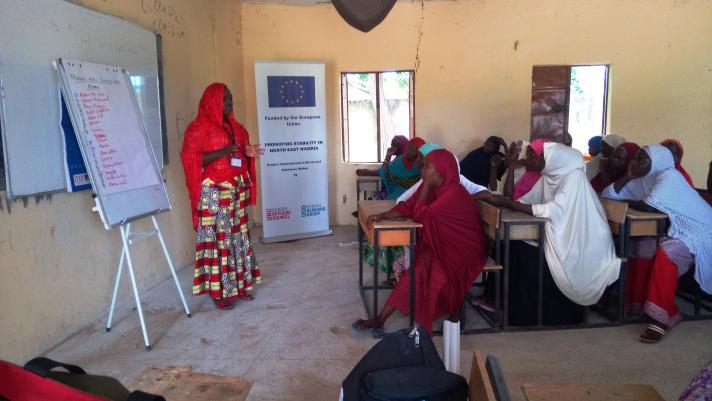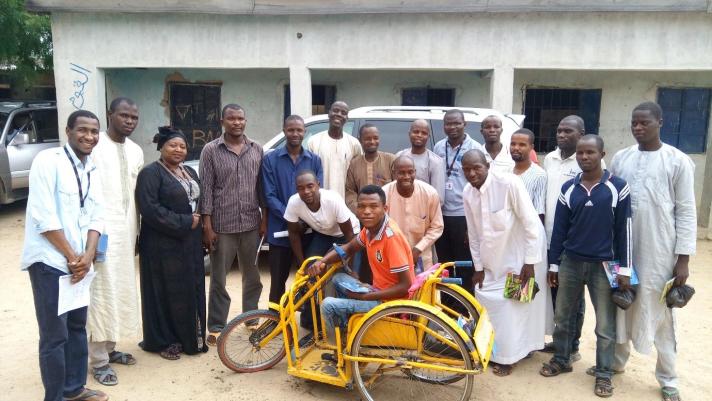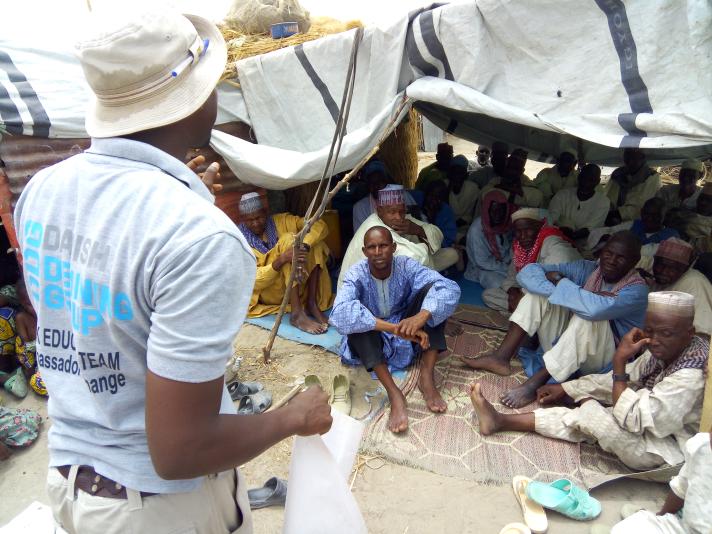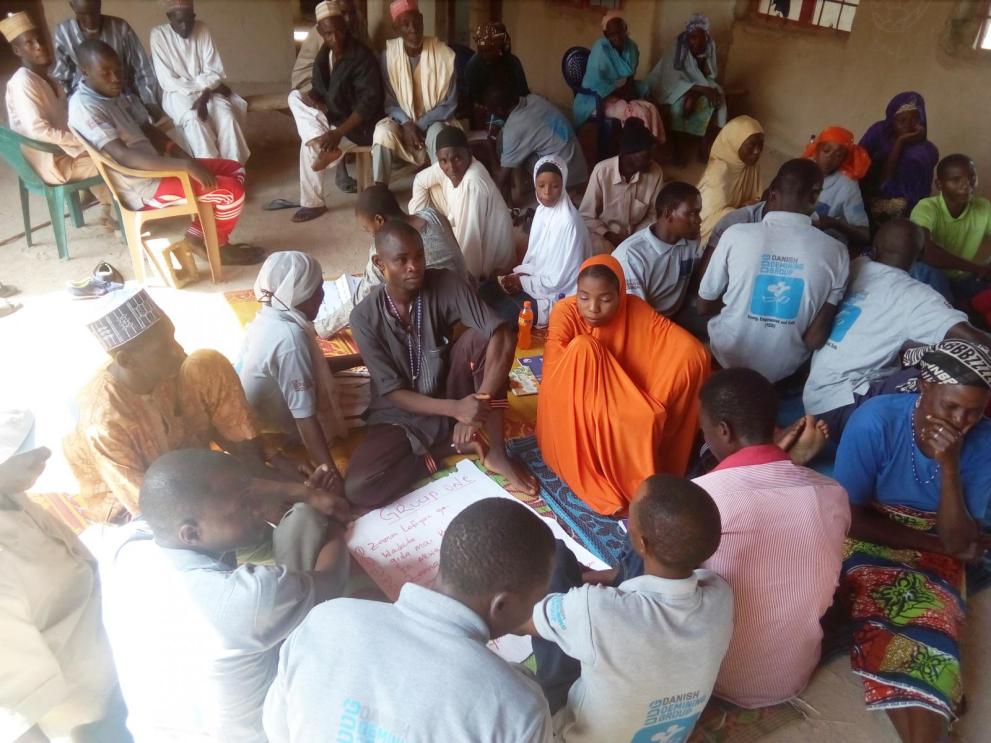
North-East Nigeria continues to experience a significant humanitarian crisis, resulting from the ongoing armed conflict between Boko Haram, the Nigerian military, and the Multi-National Task Force. In 2017, the violent conflict in North-East Nigeria entered its eighth year and indications suggest that the crisis will continue into the near future. The conflict has already led to widespread displacements, violations of international humanitarian and human rights law, protection risks, and an ever-growing humanitarian crisis. An estimated 1.8 million people remain internally displaced by the conflict and 200,000 have sought refuge in neighbouring countries of Cameroon, Chad, and Niger.
The youth and the conflict
Youth constitute the majority of the population in most of the conflict and displacement prone contexts within which Danish Refugee Council-Danish Demining Group (DRC-DDG) operate, and North-East Nigeria is no exception, where young people account for many of those adversely affected by the conflict as it has disrupted their access to education and social services. Some have been subjected to overwhelming violence that will have a long-term impact on their psychological well-being. Even prior to the conflict, educational levels in the region were very low, and the average unemployment rate in Nigeria is 38 percent and much higher in the North-East States. Unemployed and out of school youths, widespread poverty and disenfranchisement contribute to generalized frustration. At this critical point of their live, young men and women who lack economic opportunities are more likely to use negative coping mechanisms for income generation, such as drug trafficking, and involvement in armed, criminal groups. Another consequence of conflict and displacement is the late transition from youth into adulthood, which often comes with frustrations of being stuck in a “waithood” or “young man” stage. Youth without family and/or out of school are especially at risk of seeking protection in criminal gangs and engage in crime and violence. The EU Emergency Trust Fund for Africa and its implementing partner DRC-DDG think that Youth must be considered a central actor in the recovery process, and a failure to invest in youth-led development will likely result in failure to address the root causes of this conflict. Youth need to feel they have an identity, a purpose and a value in society. The threat of radicalisation in this context is not simply about poverty and employment, but also about wider marginalisation and exclusion.
Why DRC-DDG is focusing on youth empowerment in North-East Nigeria?
Through its programme “Promoting Stability in Nigeria’s North-East”, the EU Emergency Trust Fund for Africa and DRC-DDG intend, among other objectives, to empower youth and restore their sense of belonging to the community, offering them alternative to violence and radicalization. This comprehensive programme, funded by the European Union and implemented jointly by the Danish Demining Group and the Danish Refugee Council (DRC-DDG), seeks to promote stability and resilience among displaced-affected communities in North-East Nigeria, in particular youth and women living in Borno and Adamawa states. The programme develops a wide range of activities in livelihoods, armed violence reduction and mine risk education sectors and is implemented in 18 communities across the most conflict affected states of North-East Nigeria.
Youth are considered central actors of this multi-faceted intervention, which is developed around the Youth, Empowered and Safe (YES) approach developed by DDG and inspired by the successful community safety planning methodology implemented in other countries across East and West Africa. To ensure youth remain the drivers of the intervention, a number of complementary activities are based on the needs identified through the youth empowerment (YES) process. Designed to promote a multi-sectoral and integrated approach, these activities include entrepreneurship and vocational trainings, capacity building in conflict resolution, leadership and communication, and social cohesion activities such as inter-generational dialogues, youth-security providers' dialogues and recreational activities. By putting the YES plans at the centre of the implementation of the programme, DRC-DDG hopes to address the needs of at-risk youths on several fronts while ensuring that the skills acquired will create a powerful resource for the future, as their cultivation is essential for youth to build the strength they need to address future crises on their own.
The YES planning process: a learning tool that promotes youth's participation in stability restoration
Gonidamgari is a community in the outskirts of Maiduguri, capital of Borno state, the most conflict-affected state in North-East Nigeria. Gonidamgari has been one of the first communities to suffer from Boko Haram’s violent rise in 2009, as the former home of the terrorist group’s founder. Most of the young people have been displaced in different parts of Borno state due to insecurity. Over the last year, the community members, including youth, have returned and despite all the challenges, have started resuming with their lives. As safety slowly improves in the community, more people have come to settle, and the population has been growing, putting increasing pressure on limited and already overstretched resources.
Abdul Karim, 32 years old, was born in Gonidamgari. Today, he lives with his parents and eight brothers and sisters. He is a young business man who supports his family selling and buying livestock around the city. Before the insurgency, he used to travel a lot throughout the country to keep his multiple businesses running. However, because the conflict has disrupted existing market structures and most of the community’s properties, his trading activities are now limited to small scale animal trade in the surroundings of Maiduguri.
But Abdul Karim is not only a business man. He is also the youth leader of Gonidamgari community. As such, he considers himself as a “servant to the community”, helping his fellow citizens in mobilizing the community around specific issues affecting the youth, acting as a link between the youth and the elders. When asked about the challenge for youth in his community, Abdul Karim mentions the stereotypes people generally have towards youth, about their ability to work and to contribute to the society. “Youths are not lazy. They have their own capacities, their own work. Some are carpenters, some are tailors, but most of them had to sell their assets in order to be able to eat.” After being identified through the YES workshop, these perceptions highlighted by Abdul Karim were discussed by youth and elders during inter-generational dialogue, opening the discussion on what are the societal norms of roles and responsibilities that each generation perceive from the other.
In May 2017, he was invited by DRC-DDG to participate in the Youth, Empowered and Safe (YES) planning process, along with more than 60 young men and women. The YES process consists of a youth-driven development of Youth Empowerment and Safety (YES) Plans, in which they elaborate their vision of an ideal future based on realistic assumptions. It is the foundation of all activities related to youth to be implemented through the “Promoting stability in Nigeria’s North-East’’ programme.
This approach allows youth to strengthen their analytical abilities, build their confidence related to their potential to contribute to their own future and to the community’s recovery, while having a safe space to share their perspectives. The objective is to empower at-risk youths such as IDPs and returnees by strengthening their skills and preference for peaceful and constructive behaviour, resilience to negative influences and access to legitimate livelihood opportunities.
In a dynamic 5-day workshop the participants, all men and women between 15 and 35 years old, are invited to define a common understanding of the concepts of Youth, Empowerment and Safety, reflecting on their own vision of themselves and what they need to feel safe and respected as a full member of their community. Youth are then asked to agree on a common vision of their ideal community and to identify three key objectives that would lead to that transformation. With facilitation from DRC-DDG Armed Violence Reducation (AVR) teams, who were previously provided with thorough theoretical and practical training on planning process facilitation, they analyse their resources bag they have as well as the different steps to be taken to reach their goal. Emphasis is put on the youth’s internal resources in order to help them realize their potential and sustains the outcomes of the planning process. The simple act of visioning and planning can be the inspiration for behaviour changes the youth engaged in the YES plans have in general not been exposed to goal setting in a positive life affirming environment.
During the workshop, the youth build their action plan, identifying concrete activities to be conducted in order to make the vision reality. Once the YES plans are finalized and agreed on by the youth, they are officially presented to the remaining youth in the community members, who are invited to bring their contributions. Once an agreement is reached on the activities proposed in the plan, the youths, supported by DRC-DDG’s AVR teams, start mobilizing resources and reaching out to different stakeholders to present their plan and engage them in its implementation.
According to Abdul Karim, the YES plan activity was very useful, as it allows the participants to experience long term planning. He added that for some of them, who have never been to school, this was the first time they were asked to reflect on what they wanted for the future. “It really helped us to learn how to plan, and to realize the value of skills and the importance of education, as it has long-term impact. Some youths realized for the first time how important it was to go to school, and now they promote it.”
When asked about the things he learned through this process, Abdul Karim insists on the fact that it’s the first time an organization comes to them and ask them to contribute. He adds that, of all the things he learned through that process, the fact that he needs to take control of his own actions and future to make it better is the most important one. “I learned to speak out. You can’t stay quiet and look if you want to be active in the community. You need to talk about problems if you want to find a solution.”
The YES plan elaborated by the youth in Gonidamgari, presented to and approved by the community, contains three visions for their future: 1) A community with independent youths; 2) A community with literate youths and qualified teachers; 3) A community with functional healthcare structure. When questioned on what he will do to make these visions reality, Abdul Karim says that together with other youths, they identified a building that can be used as a school, and another that, if rehabilitated and equipped, could be used as a health centre. “Now we need to link with other organisations, maybe the Ministry of Health, for support.”
At the end of the interview, Abdul Karim remains silent for a moment, before concluding: “With the YES process, I understood that if an organization comes to help, you need to do your own part in order to own the solution. That’s it, the YES plan is about bringing your own contribution.”
Details
- Publication date
- 3 November 2017
- Region and Country
- Nigeria
- Thematic
- Strengthening resilience of communities
- Partner
- Norwegian Refugee Council
- Danish Refugee Council
- International Rescue Committee

